
A casino is a place where people can gamble and play games of chance. It can be a glamorous and exciting experience but it can also be a seedy and depressing one. It takes a balancing act of risk and reward, wise decisions and a little luck to make a winning bet. There have been some scandals involving cheating and corruption in casinos but these are very rare, and casinos have high levels of security to prevent this.
Modern casinos have elaborate amenities to attract customers and encourage them to spend money. These include restaurants, free drinks and stage shows. Some casinos have more than one gaming floor and offer a wide range of betting options, from the traditional table games like blackjack and roulette to the newer electronic machines. Many of the most popular casino games are based on chance, including slot machines, poker, and craps.
Some casinos offer special inducements to big gamblers, known as comps. These can be free food, hotel rooms, tickets to shows or even limo service and airline tickets. Often, the amount of time a player spends gambling at a particular casino determines his or her comp level. It is important for players to understand these rules before they gamble.
Most casino gambling is governed by state or provincial laws. Some states have prohibited gambling entirely, while others have very strict regulations. Other states have relaxed their laws in recent decades and have legalized casinos on Indian reservations or on riverboats. Casinos can be found in a number of cities around the world, including Las Vegas, Atlantic City, and Macau.
Gambling is a highly addictive activity, and casinos do everything they can to keep customers hooked. They have huge promotions and bonuses to lure in gamblers, and they also employ a large staff of casino employees to monitor their patrons. These employees can tell when a player is putting too much bets on the same numbers or if someone is making multiple visits to the same machine.
In addition to these measures, most casinos use advanced technology to oversee their games. For example, some gambling tables have chips with microcircuitry that allow them to track amounts wagered minute by minute and warn the dealer if an unusual pattern is detected. Similarly, some roulette wheels are electronically monitored for statistical anomalies. These methods help to reduce cheating and other forms of criminal activity that can hurt the bottom line. This is why casinos spend so much money on security.
